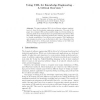Free Online Productivity Tools
i2Speak
i2Symbol
i2OCR
iTex2Img
iWeb2Print
iWeb2Shot
i2Type
iPdf2Split
iPdf2Merge
i2Bopomofo
i2Arabic
i2Style
i2Image
i2PDF
iLatex2Rtf
Sci2ools
KI
2007
Springer
2007
Springer
Using UML for Knowledge Engineering - A Critical Overview
Abstract The paper analyzes UML, the well known software engineering tool, from the knowledge engineering perspective. The goal of the paper is to evaluate UML as the possible design tool for knowledge engineering (KE). Some fundamental conceptual differences between UML and classic knowledge engineering methods are outlined. The paper aims to identify possibilities of an effective and normative UML application and extension in order to use it effectively in KE. One of the goals of the Hekate project is to develop such extensions, basing on the ARD and XTT knowledge representation methods.
KI 2007 | Knowledge Engineering | Knowledge Engineering Methods | Knowledge Engineering Perspective |
Related Content
| Added | 08 Jun 2010 |
| Updated | 08 Jun 2010 |
| Type | Conference |
| Year | 2007 |
| Where | KI |
| Authors | Grzegorz J. Nalepa, Igor Wojnicki |
Comments (0)

